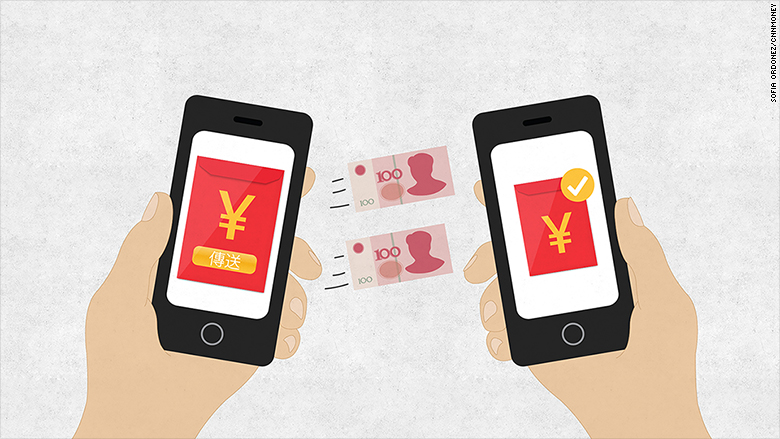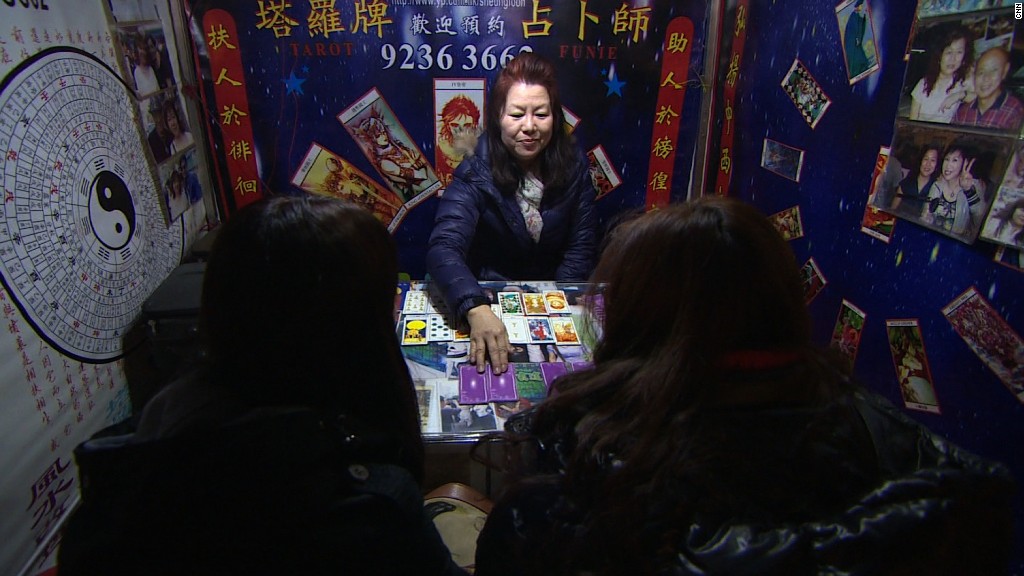
Happy New Year! Now show me the money! Or to put that another way: 新年快樂 恭喜發財 紅包拿來!
This popular saying gets a major workout around Lunar New Year, when Chinese traditionally hand out bright red envelopes, called hongbao, stuffed with crisp yuan notes, to friends, family and colleagues.
This year, many young Chinese are putting a digital twist on the old custom, gifting electronic red envelopes using services launched by two giant Chinese tech firms, Alibaba (BABA) and Tencent (TCEHY).
"It's much more convenient ... the lines get quite long around Chinese New Year at the bank," said Mao Hui, 27, who lives in Shanghai. Plus, "traveling with cash isn't always the safest, especially if you have to take the train."
Here's how it works: Gift givers link up to the digital hongbao features by adding a payment option, like a bank account. Once connected, users can directly transfer hongbao money gifts through Tencent's popular WeChat messaging app, or Alibaba's Alipay payment affiliate.
Gift receivers also have to connect their bank accounts to get their hongbao, which means Alibaba and Tencent are getting a fresh wave of mobile customers. Users that sign up for mobile payments on WeChat, for example, can then access a suite of e-commerce services and products, such as a taxi-hailing app.
Related: A fortune teller's take on the Year of the Goat

Experts say the digital hongbao features have caught on in part because they're fun. In Alibaba's network, users can play lottery games that pay out cash or coupons that can be used on the company's shopping sites. On WeChat, users can gift money to a group of friends, letting the app randomly decide who gets the money.
The two companies are in a race to capture market share -- WeChat's digital hongbao feature launched to great fanfare last year with users sending millions of electronic red envelopes, leaving Alibaba scrambling to catch up.
"For Alibaba, this is mainly a defensive move," said Nicole Peng at Canalys, a tech research firm. But it has helped boost Alibaba's social network, Laiwang, as users share their status and experiences on the platform.
Alibaba said Thursday that 1.72 billion digital envelopes have been exchanged using Alipay since Feb. 11.
Related: This Chinese brand is worth more than Alibaba
Money-stuffed physical envelopes remain the most popular gift among Chinese for holidays and other hallmark occasions -- getting married, having a baby, starting a new business, and even at funerals.
Going forward, Peng expects more digital hongbao gifts for Chinese New Year and other big gift-giving events.
"It's giving people ideas how to handle the money," she said. "A lot of Chinese work in the city and live away from their family ... it's easy to transfer money like this as a gift."
For Mao, sending digital hongbao has freed up some extra time during the busy holiday season.
There's just one catch -- she still can't gift her elders electronically. "The older generation, they just don't use these things," she said.

